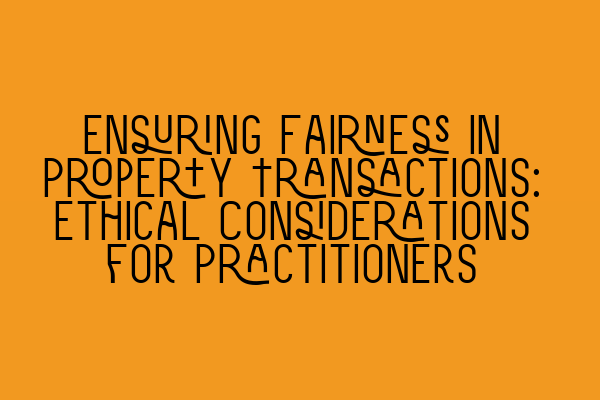Ensuring Fairness in Property Transactions: Ethical Considerations for Practitioners
As solicitors specializing in property law and land law, it is our duty to ensure fairness and uphold ethical standards in all property transactions we handle. We understand that the process of buying or selling a property can be complex and overwhelming for clients, and it is our responsibility to guide them through the process while maintaining the highest ethical standards.
In this blog post, we will discuss some key ethical considerations that practitioners should keep in mind to ensure fairness in property transactions.
1. Transparency and Full Disclosure
Transparency and full disclosure are fundamental ethical principles in property transactions. As practitioners, we must provide our clients with all relevant information about the property, including any potential issues or risks associated with it. This includes disclosing any conflicts of interest that may arise during the transaction.
By being transparent and providing full disclosure, we empower our clients to make informed decisions, ensuring fairness and avoiding potential conflicts down the line.
2. Acting in the Client’s Best Interest
Our primary duty as practitioners is to act in the best interest of our clients. This means putting their needs and priorities above all else. We must provide competent and diligent representation, advocating for our clients’ rights and interests throughout the transaction.
It is essential to establish a clear line of communication with our clients and understand their goals and objectives. By doing so, we can tailor our advice and strategies to meet their specific needs.
3. Avoiding Unfair Influence or Exploitation
Practitioners must avoid any unfair influence or exploitation that may compromise the fairness of a property transaction. This includes refraining from taking advantage of clients’ lack of knowledge or vulnerable positions.
It is crucial to ensure that clients fully understand the terms and conditions of the transaction and have the opportunity to seek independent legal advice. By doing so, we protect them from any potential exploitation and ensure fairness in the transaction.
4. Conflict Resolution
Conflict resolution is another crucial ethical consideration in property transactions. Disputes may arise during the course of a transaction, and it is our responsibility as practitioners to handle them fairly and efficiently.
We should encourage open communication and negotiation between parties to resolve conflicts amicably. If resolution becomes difficult, we may consider alternative methods, such as mediation or arbitration, to reach a fair outcome for all parties involved.
5. Continuing Professional Development
To stay abreast of the latest developments and maintain our expertise in property law and ethics, practitioners must engage in continuous professional development. This includes regularly attending relevant seminars, workshops, and training programs.
By staying updated and enhancing our knowledge, we can provide our clients with the best possible service, ensuring fairness and ethical practice in all property transactions.
Conclusion
Ensuring fairness in property transactions is not only a legal responsibility but also an ethical obligation for practitioners. By following these ethical considerations, we can maintain the highest standards of professionalism and integrity in our practice.
If you are preparing for the SQE 1 or SQE 2 exam, check out our related articles:
